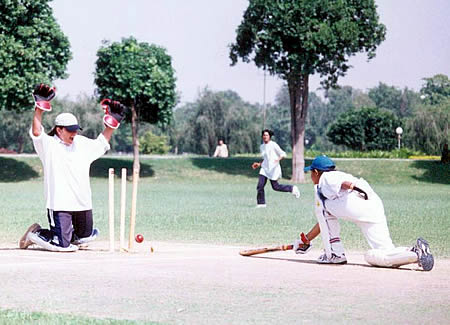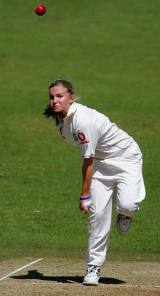Quite a Cinderella story
Women's cricket is beginning to emerge from the shadows
Jenny Thompson
30-Dec-2005
|
|

|
At a time when the women's game needed a shot in the arm it got a welcome
boost in May when, as expected, the IWCC merged with the ICC. This was a
significant fillip in a year in which one team - West Indies - nearly
dropped out of the World Cup because of a lack of funding.
Such financial worries should now be a thing of the past, leaving the
women free to concentrate on their game, which is one that should become
even more professional if the ICC delivers on its promises.
International teams have already benefited from various mergers of their
men's and women's boards, none more so than in Pakistan where this year
the women's game took unprecedented steps forward, under the
umbrella of the Pakistan Cricket Board who they merged with in 2004.
After years of trying to gain recognition from the government, the PCB and
the public alike, Pakistan finally hosted their first match on home soil,
against India Under-21. It was a massive, almost inestimable, stride not
just for women's cricket, but for women's rights too in the largely
conservative Islamic republic.
Only ten years ago the first moves to introduce cricket to Pakistani women
- by sisters Shaiza and Sharmeen Khan - had resulted in death threats and
court cases and even in 2003, playing cricket in public was virtually
unknown for women in Pakistan. But then came the India tour - which was
immediately followed up with the Women's Asia Cup in late
December, which was also held in Pakistan.
But some things were as predictable as ever. Australia won the World Cup
in South Africa, marching unbeaten into the final where they brushed aside
the first-time finalists India. But while Australia's dominance has been a
snore factor in the men's game for quite some time (until recently that
is), in the women's it continued to act as a shining example of
near-professionalism.
They beat England in the one-dayers and the Twenty20 to add to their ODI
clean sweep (3-0) against New Zealand. But cracks were starting to appear
- and they lost the Ashes in a two-match series which England won 1-0.
Just three Tests were played all year, in fact, and England were involved
in all of them; the third was a drawn affair in India.
Test cricket continues to be a curiosity in the women's game: dusted off
for the occasional outing like a rarely worn hat, it sits awkwardly,
attracts few compliments and even fewer spectators. Media coverage is
practically non-existent, although the Ashes was a pleasant exception,
even making the front page of The Times newspaper.
England's captain Clare Connor is adamant that Test cricket will not die
off just yet - even though only 16 matches have been played this
millennium. "It's a tradition we want to continue," she says, despite
there being no preparation, either mental or physical for this form of
cricket until the day arrives.
As ever, it's the one-dayers that matter - and specifically the World Cup
was the big prize up for grabs this year. But never mind trying to win,
West Indies only just made it to the tournament at the eleventh hour after
sponsors came on board to rescue them. Yet, having been chalked up as the
tournament whipping girls, these Cinderellas clawed their way into a
credible fifth place and secured automatic qualification next time around.
The stuff of dreams.
Their batsman Nadine George was then awarded the MBE for her contribution
to sport, capping a fairytale year for the team - and the sport in
general.
|
|

|
New (wo)man on the block: England's Holly Colvin - one minute she was
preparing for her GCSEs, the next a stiffer examination came in the form
of an Ashes debut at Hove. The 15-year-old sailed through and even found
herself on a hat-trick on her very first day.
Fading star: Not so much fading stars as ones who chose to hang up their
boots . Australia lost the services of Belinda Clark
and Lisa Keightley - on the stage at least; the forward-thinking Cricket
Australia went on to appoint Clark as head of their academy. England's
Lucy Pearson and Clare Taylor also quit at the top level.
High point: So many to pick from, but the IWCC merger with the ICC for
what it means for the future, and the situation in Pakistan for burying
some of the ghosts of the past certainly rank foremost.
Low point: Robin Marlar set the cause back with his misogynistic comments
- "Girls! It's absolutely outrageous!" - while Cathryn Fitzpatrick stirred
up controversy by helping as an unpaid assistant coach for Australia men's
Test against the World XI. "I can't cop that" fumed Terry Alderman. "There
are highly talented fast bowling coaches around the country yet they get
someone like that in."
What does 2006 hold? India are visiting England and their itinerary
includes a trip to Lord's, a match which will presumably be attended by
Marlar in his capacity as the new president of MCC. Standby for fireworks.
Tomorrow: Pakistan add method to madness
Jenny Thompson is assistant editor of Cricinfo